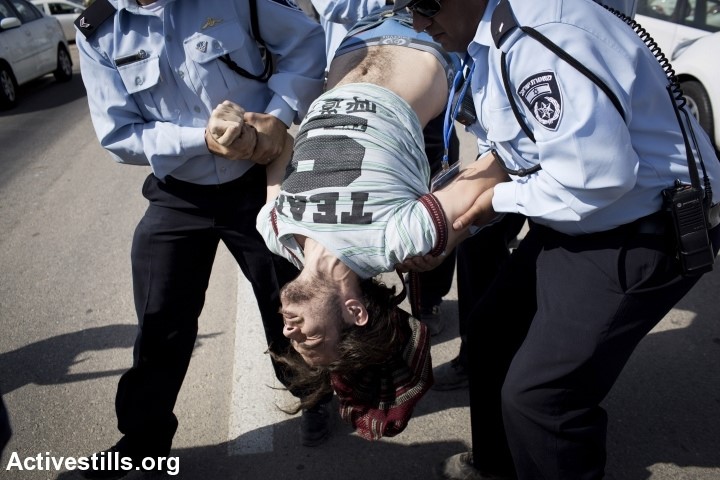Israel’s ministers voted in a special cabinet session on Sunday to demolish an Arab-Bedouin village in the Negev and replace it with a religious Jewish community. The new community on the site is to be called Hiran. The Bedouin village slated for demolition, Umm al-Hiran.
Hiran will be built on top of the existing Bedouin village of Umm al-Hiran, whose 500 residents will be evicted. The Arab-Bedouin village of Umm al-Hiran was established in 1956 following a decision of Israel’s military governor. It was intended for Bedouin families who were evicted from the western Negev area, near Kibbutz Shoval. The Israeli government, however, never recognized this village created by its own military government and prevented it from receiving the most basic of services such as electricity, water and health care.

Policemen arrest an activist outside Israeli cabinet session at Kibbutz Sde Boker during a protest against the demolition of Umm al-Hiran to make room for a Jewish settlement in their place, November 10, 2013 (Photo: Activestills)
Hadash strongly protested the decision. MK Dov Henin (Hadash) stated that “it’s particularly egregious that a new Jewish town will be built in place of a Bedouin town, which will be destroyed… Instead of thinking of ways to develop the Negev for the good of all of its residents, the government is taking aggressive and problematic measures that will just turn the Negev into a giant conflict zone.”
In September 2011, the Israeli government approved the “Prawer Plan”. One of the implications of this plan is a relocation of some 40,000–70,000 Negev Bedouin to government-approved townships. The plan was described as part of a campaign to develop the Negev and to bring better integration of Bedouin communities in Israeli society by concentrating them in townships. At the same time, Jewish families have been encouraged to settle in the Negev in small communities, fully serviced with water and electricity. On 24 June 2013, the Israeli Knesset approved an amended version of the original plan named Prawer-Begin Bill, with 43 votes for and 40 votes against. If fully implemented, the plan will result in the largest single act of forced displacement of Arab citizens of Israel since the 1950s including the destruction of 35 villages.
In reaction to the approval of the new settlements Palestinian activists call for a global day of protest on November 30. The protests will take place simultaneously in the Negev, Haifa, Ramallah, and Gaza City, as well as in several locations worldwide, and will be named the “International Day of the Negev.”


